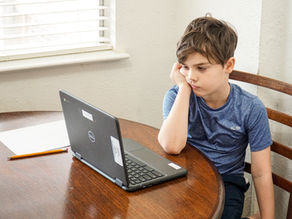Why Do I Get Grumpy When I’m Tired?
- Mar 17, 2022
- 3 min read
Updated: Nov 14, 2023
We’ve all been there. You had a bad night- went to bed late, or couldn’t sleep, and when the alarm goes off it feels like a herculean effort to drag yourself out of bed.

But even once you are up, the problems aren’t over. The whole day is a struggle- you might find yourself fighting to concentrate, and snapping at those around you. Maybe you end up getting tearful over problems that normally you’d have handled with ease, or feeling anxious, stressed and overwhelmed. It turns out that there is an important scientific reason why it’s harder to control your emotions when sleep deprived- and it might just give us a glimpse into what it’s like for kids too.

First, a bit of background. There are two important brain networks involved in our emotions. The limbic system is buried deep inside the brain, and includes the amygdala and hippocampus. This is the reactive part of your emotional brain. It has evolved to protect you, so is quick to jump into action, triggering the fear response, for example, when you see something that might be a threat. But it often overreacts (have you ever jumped out of your skin at a ball of fluff that you thought was a terrifying spider- it’s your amygdala you have to blame for that!). The second network, driven by areas of the prefrontal cortex, is slower to respond, but more rational and thoughtful. This exerts control over the reactive limbic system, and allows you to calm down as soon as you realise what you saw was actually nothing to worry about.
In healthy adults, these two systems work together, and the prefrontal system can, mostly, keep a lid on our emotional reactions. We might feel angry, but we can stop, take a breath and count to 10 before replying, as our prefrontal regions control the limbic system’s desire to shout. We might get upset, but our prefrontal system allows us to keep control of the tears that want to flow. If you put an adult in a brain scanner, you will see that the more activation there is in the prefrontal cortex, the less there is in the amygdala, and vice versa. But when we are sleep deprived, the connections between these two systems become weaker. Our prefrontal regions lose the control they normally have over the limbic system, and our emotions can begin to run wild.

When it comes to children, it’s a different story. Scanning studies have shown that in children under 10 activation in these regions actually goes hand-in-hand, and this gradually changes to a more adult-like pattern over the course of adolescence. And these changes predict the decrease in separation anxiety we see as children get older. Scientists think that the connections from the amygdala to the prefrontal cortex develop before the ones in the other direction- so emotions can activate their ‘thinking brains’, but the ‘thinking brain’ can’t yet damp down their emotions- much like a sleep deprived adult. But all is not lost. While young kids might not be able to regulate their own emotions, there is something powerful that can- their caregivers. In fact, even looking at a picture of a parent can lower the amygdala’s response. But if the caregiver is stressed and anxious, this benefit goes away, and in fact, the child can become more dysregulated.

So why am I telling you this? It can be easy to get frustrated with a toddler having a tantrum, a child reacting as if a broken pencil is the end of the world, or a teenager who snaps at a simple question. But I think that understanding a little more about their brains, and the ways in which emotional regulation develops over time, can help us all to be more empathetic. Remember how difficult it can be to control your emotions when you are tired, and those prefrontal cortex - amygdala connections aren’t functioning well, and imagine how it must be when they aren’t yet fully developed. How big a deal small things can feel. And that what you need is comfort and support, and a safe space to talk about emotions, to try to avoid the issue escalating. It might be easier said than done, but just maybe understanding that could help us all to guide the young people in our lives and help them deal with emotions a little better.
Loved this post? Check out our other mental wellbeing tips and resources for PSHE lessons or wellbeing activities for primary schools. Or book a Braintastic! Science expert to deliver mental wellbeing workshops in your school, including our super popular session on science and creativity.










